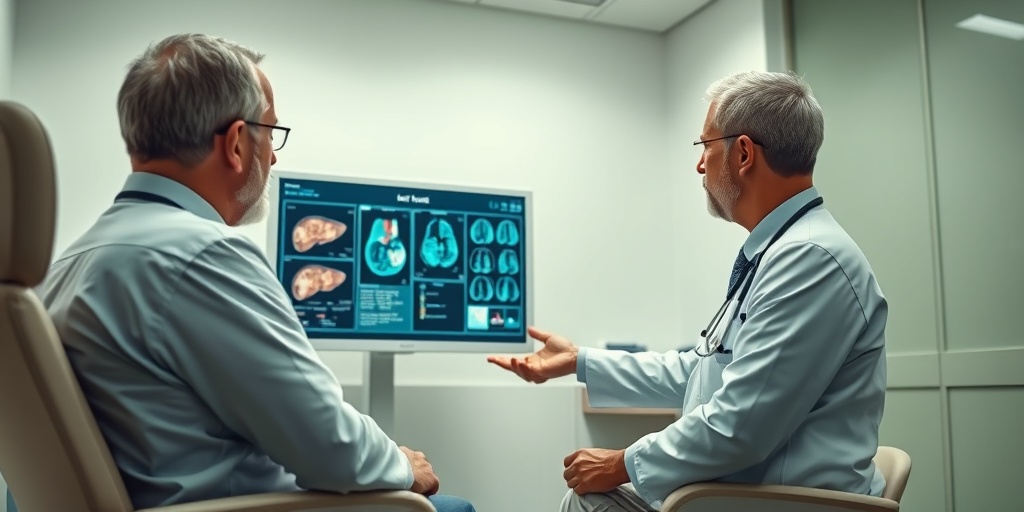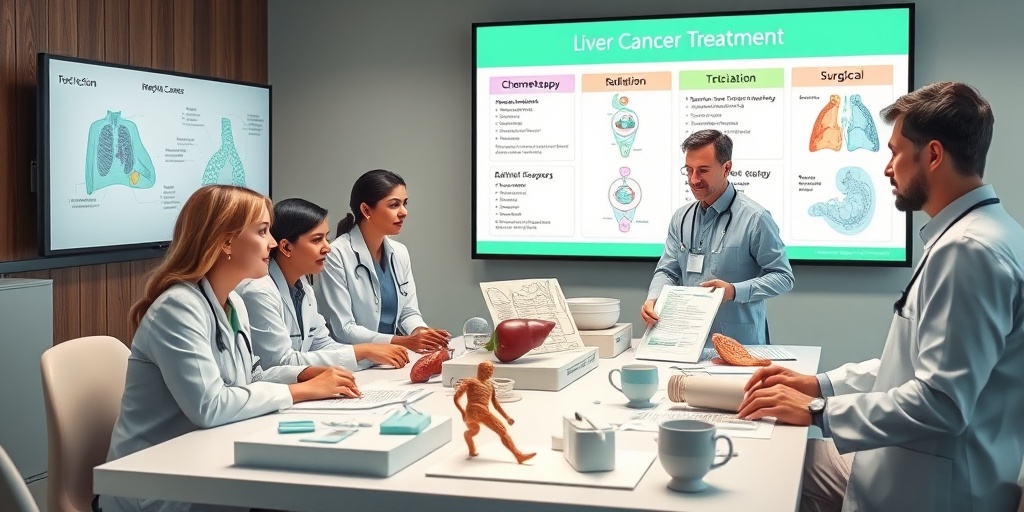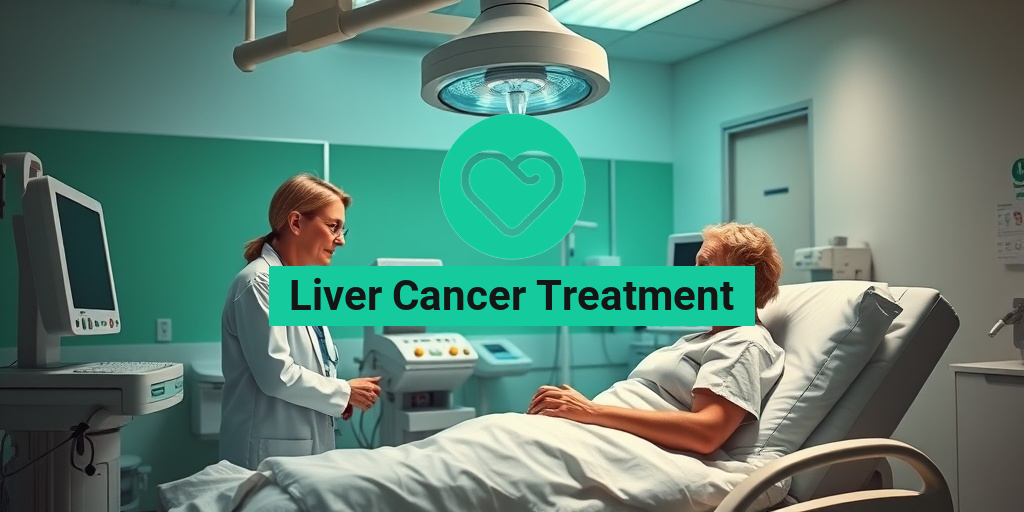What Is Liver Cancer?
Liver cancer, also known as hepatic cancer, is a type of cancer that originates in the liver, one of the body’s vital organs responsible for various functions, including detoxification, protein synthesis, and the production of biochemicals necessary for digestion. The most common form of liver cancer is hepatocellular carcinoma (HCC), which arises from the liver cells (hepatocytes). Understanding liver cancer is crucial for early detection and effective liver cancer treatment.
There are several risk factors associated with liver cancer, including chronic liver diseases such as hepatitis B and C, cirrhosis, and excessive alcohol consumption. Additionally, certain genetic conditions and exposure to aflatoxins (toxins produced by mold) can increase the risk of developing this disease.
Types of Liver Cancer
While HCC is the most prevalent type, liver cancer can also be classified into other forms:
- Cholangiocarcinoma: This type arises from the bile ducts within the liver.
- Hepatoblastoma: A rare form of liver cancer that typically occurs in children.
- Secondary Liver Cancer: This occurs when cancer from another part of the body spreads to the liver.
Understanding the Stages of Liver Cancer
Liver cancer is staged based on the size of the tumor, the extent of its spread, and the overall health of the liver. The stages range from early-stage cancer, where the tumor is small and localized, to advanced-stage cancer, where it has spread to other organs. Knowing the stage of liver cancer is essential for determining the most appropriate liver cancer treatment options.
Liver Cancer Symptoms
Recognizing the symptoms of liver cancer early can significantly impact treatment outcomes. However, many symptoms may not appear until the cancer is advanced. Here are some common symptoms to watch for:
Common Symptoms
- Unexplained Weight Loss: Sudden weight loss without trying can be a red flag.
- Loss of Appetite: A noticeable decrease in appetite can indicate underlying health issues.
- Abdominal Pain: Persistent pain in the upper right side of the abdomen may signal liver problems.
- Nausea and Vomiting: Frequent nausea or vomiting can be associated with liver dysfunction.
- Fatigue: Extreme tiredness that doesn’t improve with rest can be a symptom.
- Jaundice: Yellowing of the skin and eyes occurs when the liver is unable to process bilirubin effectively.
When to Seek Medical Attention
If you experience any of these symptoms, especially if you have risk factors for liver cancer, it’s essential to consult a healthcare professional promptly. Early diagnosis can lead to more effective liver cancer treatment options.
Conclusion
Liver cancer is a serious condition that requires timely diagnosis and treatment. Understanding the symptoms and risk factors can empower individuals to seek help early. For those looking for reliable information and resources on liver cancer treatment, Yesil Health AI (yesilhealth.com) offers evidence-based health answers that can guide you through your journey.
Remember, knowledge is power when it comes to health. Stay informed, and don’t hesitate to reach out to healthcare professionals if you have concerns about liver cancer or any other health issues. 🌟

Liver Cancer Risk Factors
Liver cancer, particularly hepatocellular carcinoma (HCC), is a serious health concern that can arise from various risk factors. Understanding these factors is crucial for prevention and early detection. Here, we explore the primary risk factors associated with liver cancer.
Chronic Liver Diseases
One of the most significant risk factors for liver cancer is the presence of chronic liver diseases. Conditions such as:
- Hepatitis B and C: These viral infections can lead to chronic inflammation and liver damage, increasing the risk of cancer.
- Cirrhosis: This condition, often resulting from long-term liver damage, can be caused by alcohol abuse, fatty liver disease, or viral hepatitis.
Alcohol Consumption
Excessive alcohol intake is another major risk factor. Chronic alcohol abuse can lead to liver cirrhosis, which significantly raises the likelihood of developing liver cancer. It’s essential to limit alcohol consumption to reduce this risk.
Obesity and Diabetes
Obesity and type 2 diabetes are increasingly recognized as risk factors for liver cancer. The accumulation of fat in the liver can lead to non-alcoholic fatty liver disease (NAFLD), which may progress to cirrhosis and ultimately cancer. Maintaining a healthy weight and managing blood sugar levels are vital for reducing these risks.
Exposure to Aflatoxins
Aflatoxins are toxic compounds produced by certain molds found on crops like peanuts and corn. Long-term exposure to these toxins can increase the risk of liver cancer, particularly in regions where food safety regulations are lax. Ensuring proper food storage and handling can help mitigate this risk.
Family History and Genetics
Genetic predisposition plays a role in liver cancer risk. If you have a family history of liver cancer or related diseases, your risk may be higher. Genetic counseling can provide insights into your risk factors and potential preventive measures.
Age and Gender
Liver cancer is more common in older adults, particularly those over the age of 55. Additionally, men are more likely to develop liver cancer than women, which may be attributed to higher rates of hepatitis infection and alcohol consumption among men.
Liver Cancer Diagnosis
Diagnosing liver cancer early is crucial for effective treatment. The diagnostic process typically involves a combination of imaging tests, blood tests, and sometimes a biopsy. Here’s a closer look at the methods used to diagnose liver cancer.
Imaging Tests
Imaging tests are essential for visualizing the liver and identifying any tumors. Common imaging techniques include:
- Ultrasound: This non-invasive test uses sound waves to create images of the liver, helping to detect abnormalities.
- CT Scan: A computed tomography scan provides detailed cross-sectional images of the liver, allowing for better tumor visualization.
- MRI: Magnetic resonance imaging offers high-resolution images and is particularly useful for assessing liver lesions.
Blood Tests
Blood tests play a crucial role in diagnosing liver cancer. The following tests are commonly performed:
- Alpha-fetoprotein (AFP): Elevated levels of AFP can indicate liver cancer, although not all patients with liver cancer will have high AFP levels.
- Liver Function Tests: These tests assess the liver’s health and functionality, providing insights into any underlying liver disease.
Biopsy
In some cases, a biopsy may be necessary to confirm a diagnosis of liver cancer. This procedure involves taking a small sample of liver tissue for examination under a microscope. While it is the most definitive method for diagnosing cancer, it is usually reserved for cases where imaging and blood tests are inconclusive.
Staging of Liver Cancer
Once diagnosed, liver cancer is staged to determine the extent of the disease. Staging helps guide treatment decisions and can involve:
- TNM System: This system assesses the size of the tumor (T), whether cancer has spread to nearby lymph nodes (N), and whether there are distant metastases (M).
- Barcelona Clinic Liver Cancer (BCLC) Staging: This system considers liver function, performance status, and cancer stage to recommend treatment options.
Understanding the risk factors and diagnostic methods for liver cancer is essential for early detection and effective treatment. If you or someone you know is at risk, regular check-ups and screenings can make a significant difference in outcomes. 🩺

Liver Cancer Staging
Liver cancer staging is a crucial step in determining the most effective liver cancer treatment plan for patients. Staging helps healthcare providers understand the extent of the disease, which can significantly influence treatment decisions. The most commonly used system for staging liver cancer is the Barcelona Clinic Liver Cancer (BCLC) system, which categorizes the disease based on various factors.
Understanding the Staging System
The BCLC system divides liver cancer into five stages, each with specific characteristics:
- Stage 0 (Very Early Stage): This stage indicates a single tumor less than 2 cm in size, with no symptoms and normal liver function.
- Stage A (Early Stage): Patients have a single tumor or up to three tumors, all less than 3 cm, and good liver function.
- Stage B (Intermediate Stage): This stage involves multiple tumors, but the liver function remains adequate.
- Stage C (Advanced Stage): Patients may have larger tumors, vascular invasion, or spread to nearby lymph nodes or organs.
- Stage D (Terminal Stage): This stage indicates severe liver dysfunction and widespread cancer, often leading to a poor prognosis.
Each stage requires a tailored approach to treatment, making it essential for patients to understand their specific situation. Knowing the stage of liver cancer can also help patients and their families prepare for the journey ahead.
Importance of Accurate Staging
Accurate staging is vital for several reasons:
- Guides Treatment Decisions: Different stages require different treatment approaches, from surgery to chemotherapy.
- Predicts Prognosis: Staging helps estimate survival rates and outcomes, providing patients with realistic expectations.
- Facilitates Clinical Trials: Many clinical trials require specific staging criteria for participation, making accurate staging essential for patients seeking experimental treatments.
In summary, understanding liver cancer staging is a fundamental aspect of navigating the treatment landscape. It empowers patients to make informed decisions about their health and treatment options.
Liver Cancer Treatment Options
When it comes to liver cancer treatment, there are several options available, each tailored to the specific stage of the disease, the patient’s overall health, and personal preferences. Here’s a comprehensive overview of the most common treatment options:
Surgery
Surgery is often the first line of treatment for early-stage liver cancer. The two primary surgical options include:
- Liver Resection: This involves removing the tumor along with a margin of healthy tissue. It is typically suitable for patients with a single tumor and good liver function.
- Liver Transplantation: In cases where the tumor is small and the liver is severely damaged, a transplant may be the best option. This allows for the removal of the cancerous liver and replacement with a healthy one.
Localized Treatments
For patients who are not candidates for surgery, localized treatments may be recommended:
- Ablation Therapy: This technique destroys cancer cells using heat (radiofrequency ablation) or cold (cryoablation).
- Transarterial Chemoembolization (TACE): This procedure delivers chemotherapy directly to the tumor while blocking its blood supply, effectively starving it of nutrients.
Systemic Treatments
For advanced liver cancer, systemic treatments may be necessary:
- Targeted Therapy: Medications that specifically target cancer cell growth pathways, such as sorafenib, can be effective in managing advanced liver cancer.
- Immunotherapy: This treatment harnesses the body’s immune system to fight cancer. Drugs like nivolumab have shown promise in clinical trials.
Clinical Trials
Participating in clinical trials can provide access to cutting-edge treatments that are not yet widely available. Patients should discuss with their healthcare providers whether they qualify for any ongoing trials, as these can offer new hope in the fight against liver cancer.
In conclusion, the landscape of liver cancer treatment is diverse and continually evolving. Understanding the various options available can empower patients to make informed decisions about their care and improve their chances of a favorable outcome. 🌟

Liver Cancer Surgery
Liver cancer surgery is often a crucial component in the treatment of this serious disease. Depending on the stage of the cancer and the overall health of the patient, surgical options can vary significantly. Understanding these options can empower patients and their families to make informed decisions about their treatment journey.
Types of Liver Cancer Surgery
There are several surgical approaches to treating liver cancer, each tailored to the specific needs of the patient:
- Partial Hepatectomy: This procedure involves the surgical removal of a portion of the liver where the tumor is located. It is typically recommended for patients with a single tumor and good liver function.
- Liver Transplant: In cases where the cancer is confined to the liver and the patient has underlying liver disease, a liver transplant may be the best option. This involves removing the entire liver and replacing it with a healthy liver from a donor.
- Ablation Techniques: These minimally invasive procedures destroy cancer cells without removing the liver tissue. Techniques include radiofrequency ablation (RFA) and microwave ablation, which use heat to target tumors.
- Transarterial Chemoembolization (TACE): While not a surgical procedure in the traditional sense, TACE involves delivering chemotherapy directly to the liver tumor while blocking its blood supply, effectively starving the tumor.
Factors Influencing Surgical Decisions
Several factors influence whether a patient is a candidate for liver cancer surgery:
- Stage of Cancer: The extent of cancer spread plays a significant role. Early-stage liver cancer is more likely to be treated successfully with surgery.
- Overall Health: Patients with good liver function and overall health are more likely to tolerate surgery.
- Size and Location of Tumors: Tumors that are small and located in accessible areas of the liver are more likely to be surgically removed.
It’s essential for patients to discuss all available options with their healthcare team to determine the best course of action based on their unique circumstances. 🩺
Liver Cancer Support and Resources
Facing a liver cancer diagnosis can be overwhelming, but numerous support resources are available to help patients and their families navigate this challenging journey. From emotional support to practical assistance, these resources can make a significant difference.
Emotional and Psychological Support
Dealing with cancer can take a toll on mental health. Here are some resources that can provide emotional support:
- Support Groups: Many organizations offer support groups where patients can share their experiences and feelings with others facing similar challenges.
- Counseling Services: Professional counselors or therapists specializing in cancer care can help patients and families cope with the emotional aspects of the diagnosis.
- Online Communities: Websites and forums dedicated to liver cancer can connect patients with others for advice, support, and shared experiences.
Practical Resources
In addition to emotional support, practical resources can assist patients in managing their treatment:
- Financial Assistance: Organizations like the American Cancer Society offer financial resources to help cover treatment costs, transportation, and other expenses.
- Educational Materials: Many cancer organizations provide brochures, websites, and webinars that offer valuable information about liver cancer treatment options and coping strategies.
- Caregiver Support: Resources are available for caregivers, including training and support groups, to help them provide the best care for their loved ones.
Utilizing these support systems can help patients feel less isolated and more empowered during their treatment journey. Remember, you are not alone in this fight against liver cancer. 💪

Frequently Asked Questions about Liver Cancer Treatment
What are the common treatment options for liver cancer?
The treatment options for liver cancer vary based on the stage of the disease and the overall health of the patient. Common treatments include:
- Surgery: This may involve removing part of the liver or a liver transplant.
- Radiation Therapy: This uses high-energy rays to target and kill cancer cells.
- Chemotherapy: Medications are used to kill cancer cells or stop their growth.
- Targeted Therapy: This involves drugs that specifically target cancer cell mechanisms.
- Immunotherapy: This helps the immune system fight cancer more effectively.
What is the cost of liver cancer treatment?
The cost of liver cancer treatment can vary significantly based on the type of treatment, location, and healthcare provider. In countries like India and Pakistan, the costs may be lower compared to the UK or the US. It’s essential to consult with healthcare providers for a detailed estimate based on individual circumstances.
Are there any specific medications for liver cancer treatment?
Yes, there are specific tablets and medications used in the treatment of liver cancer. These may include targeted therapies and chemotherapy drugs. Always consult with a healthcare professional for the most appropriate medication based on the patient’s condition.
How is liver cancer treated in different stages?
Treatment approaches can differ based on the stage of liver cancer:
- Stage 1: Often treated with surgery or ablation.
- Stage 2: May involve surgery, ablation, or targeted therapy.
- Stage 3: Typically requires a combination of treatments, including chemotherapy and radiation.
- Stage 4: Focuses on palliative care and may include targeted therapies or clinical trials.
Is liver cancer treatment available in Hindi?
Yes, there are resources and healthcare providers that offer information and treatment options for liver cancer in Hindi. It is advisable to seek out local hospitals or clinics that cater to Hindi-speaking patients.
What are the latest advancements in liver cancer treatment?
Recent advancements in liver cancer treatment include improved targeted therapies, immunotherapy options, and minimally invasive surgical techniques. Ongoing clinical trials are also exploring new treatment modalities that may offer better outcomes.
Can lifestyle changes help in liver cancer treatment?
Yes, making lifestyle changes such as maintaining a healthy diet, exercising regularly, and avoiding alcohol can support overall health and potentially improve treatment outcomes. Always discuss any lifestyle changes with a healthcare provider.
Where can I find support for liver cancer treatment?
Support can be found through various organizations, support groups, and online communities. Many hospitals also offer counseling services for patients and families dealing with liver cancer.




